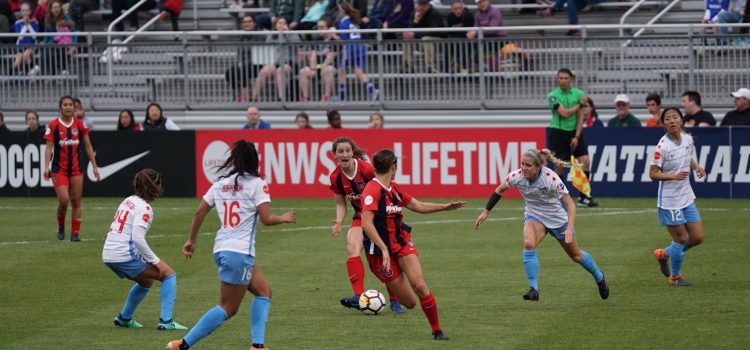
This is a free excerpt from one of Shortform’s Articles. We give you all the important information you need to know about current events and more.
Don't miss out on the whole story. Sign up for a free trial here .
What’s behind the latest FIFA controversy? What are the specific issues with women’s soccer teams?
As the FIFA Women’s World Cup approaches, players are embroiled in battles and controversies with officials around equal rights and equal treatment. From clashes over LGBTQ+ rights to the pursuit of equal pay, women’s soccer has been shaken by conflict.
Read on to discover some of the recent issues and how they might affect the upcoming World Cup.
Unraveling the FIFA Controversy in Women’s Soccer
The FIFA controversy continues as the Women’s World Cup approaches—protests and high-profile resignations have dominated the headlines with players demanding equal rights and equal treatment. The turmoil could potentially spell trouble for the upcoming global event, which runs from July 20 through August 20, with games in cities across Australia and New Zealand.
Protests from women’s teams come in the wake of other recent controversies in the world of FIFA soccer. The 2022 men’s World Cup in Qatar saw players planning to wear “One Love” armbands to protest the anti-LGBTQ+ laws of the host country—a plan they abandoned when FIFA threatened them with sanctions. Germany’s team then protested that decision by covering their mouths during a photo, symbolizing the silencing of their voices.
The political tensions between players and their national and international federations set the stage for the Women’s World Cup this year. The underlying themes include fair treatment, equal representation, and anti-discrimination in sports, particularly with regard to gender and sexual orientation. Let’s take a look at what specific issues women’s soccer teams are protesting.
The Fight for LGBTQ+ Equality
After public backlash about the federation’s censoring of players during the Qatar games, FIFA President Gianni Infantino said in March that lessons had been learned. Seeking to avoid further confrontation with the women’s teams this summer, he promised to work toward resolutions with players. But shortly thereafter the FIFA President generated another controversy around the same issue—LGBTQ+ rights.
The controversy stemmed from FIFA negotiating a sponsorship deal with Saudi Arabia’s tourism department, without consulting event organizers in Australia or New Zealand. This deal would have made Visit Saudi a marquee sponsor of the Women’s World Cup. This would mean promoting tourism to a country with entrenched anti-LGBTQ+ laws, at a sporting event played by a large number of gay women athletes. In addition to the anti-homosexuality laws, Saudi law prohibited women from even attending soccer games until 2018.
The Fight Against Abusive Treatment
In addition to the LGBTQ+ rights controversy swirling around FIFA, fights against widespread abusive coaching behaviors have also been at the forefront of women’s soccer over the last few years, particularly in the US.
In January, Sinead Farrelly—who formerly played for the US and has now joined Ireland’s team—and four other players accused several US ex-coaches and other officials of abusive behaviors ranging from inappropriate comments to sexual misconduct. This resulted in four coaches being permanently banned by the US National Women’s Soccer League. Other former officials received two-year suspensions and fines.
This complaint followed a year-long investigation of the NWSL in 2022 that revealed verbal and emotional abuse and sexual misconduct at a “systemic” level. Lead investigator Sally Q. Yates said in the report that “abuse in the NWSL is rooted in a deeper culture in women’s soccer, beginning in youth leagues, that normalizes verbally abusive coaching and blurs boundaries between coaches and players.” This report highlighted the failure of leadership to address the issues and emphasized the need for clear policies and rules around acceptable behavior in sports.
The Fight for Equal Pay
The most persistent issue plaguing women’s sports as a whole, including soccer, is that of gender discrimination and pay equity. Disparities between men’s and women’s sports affect female athletes worldwide in terms of opportunities for participation and compensation.
In March 2019, the US women’s national soccer team won a gender discrimination lawsuit against the United States Soccer Federation. The lawsuit claimed that the women’s team was paid less than the men’s team, despite the fact that the women’s team had generated more revenue than the men’s between 2015 and 2019 and had achieved more success on the field—including winning four World Cup championships and four Olympic gold medals. In July 2021, a settlement was reached, including provisions for equal working conditions and accommodations, as well as an increase in pay for the women’s team. The settlement was considered a major victory for gender equality in sports.
FIFA’s President Sends a Message
Despite the recent controversies and clashes between the federation and players, FIFA President Gianni Infantino appears to be sending a supportive message about the value of women’s sports in his fight against European TV networks. In a May 2 announcement, he criticized networks across Europe for their unwillingness to pay as much for broadcast rights for the Women’s World Cup as for the men’s, calling it a “slap in the face” to women. In response, he has threatened a blackout of the tournament across five European countries—England, Germany, France, Spain, and Italy—if networks aren’t willing to pay what he considers a fair amount.

Want to fast-track your learning? With Shortform, you’ll gain insights you won't find anywhere else .
Here's what you’ll get when you sign up for Shortform :
- Complicated ideas explained in simple and concise ways
- Smart analysis that connects what you’re reading to other key concepts
- Writing with zero fluff because we know how important your time is






